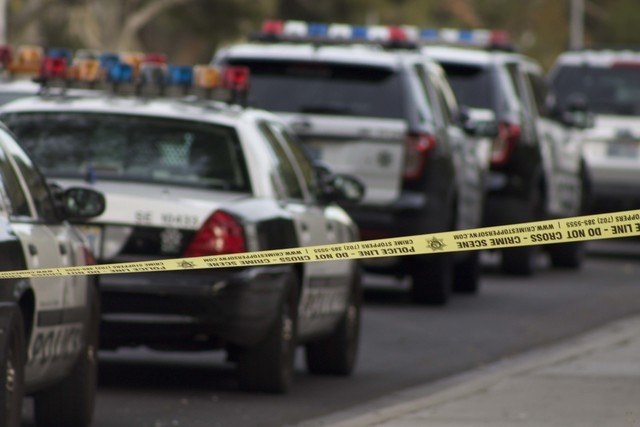Police in Las Vegas Valley still learning from deadly Ferguson incident
Fourteen months after the events in Ferguson, Mo., forced law enforcement agencies across the country to examine the ways they operate, departments across the Las Vegas Valley are still learning from the incident.
And they're teaching the next generation of cops.
Representatives from departments in Las Vegas and Henderson spoke to dozens of police academy students and residents at the University of Phoenix main campus Saturday morning about the "Ferguson effect" and how agencies are grappling with new challenges and expectations.
Michael Brown, 18, was shot and killed by then-Ferguson police officer Darren Wilson on Aug. 9, 2014. Erroneous reports that the black teen was shot while his hands were up led to days of demonstrations. When a grand jury decided in November 2014 not to indict Wilson, who is white, cities across the country erupted in protest.
The U.S. has seen incident after incident where law enforcement agencies' use of deadly force against African-Americans has been questioned. The nation witnessed protests, riots and the rise of the Black Lives Matter movement.
Never before had the nation seen discussion about law enforcement practices coming from a U.S. president, said Henderson Police Chief Patrick Moers.
But the lessons learned from Ferguson will be good for police forces in the long run, Metro Lt. James LaRochelle said. LaRochelle works with the Metro team that reviews critical incidents, including officer-involved shootings, to see what lessons can be gleaned for future training.
The public is demanding transparency from police departments more than ever before, and agencies have to be prepared with a plan for dealing with the media, he said.
While some criticized the news media for having an adversarial relationship with police, LaRochelle pointed to a 2011 Review-Journal investigation into the agency's use of deadly tactics as a driving force for departmental change.
"The media pays a tremendous function in a democratic society," LaRochelle said. "They truly are a watchdog for government and for public service."
Metro's shift toward more community-oriented policing and de-escalation techniques started years before the events in Ferguson, which the speakers said might be one reason why the Las Vegas Valley didn't have the kinds of vitriolic public demonstrations that took place in cities such as Baltimore and New York.
"Ferguson helped push the agency further, but at the same time we were in a good position before Ferguson occurred," he said.
Speakers talked about the benefits of proper training for officers at every stage in their career, accountability measures such as body-worn camera systems, and the importance of recruiting more officers from minority communities.
Lt. Steve Menger, with the Silver State Law Enforcement Academy, said it was important to expose the recruits to all different kinds of law enforcement.
"There's a lot of things to look at when you're partnering with the community," he said. "It's got to be a nonstop effort. We're here to work together."
Academy recruit Alex Malone said he has discussed what happened in Ferguson in classes a lot.
"It really has raised our awareness of expectations from the public," he said. "What we're really trying to do is create a generation of thinking cops."
Contact Wesley Juhl at wjuhl@reviewjournal.com and 702-383-0391. Find him on Twitter: @WesJuhl

















